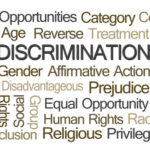Tag Archives: Florida Employment Law Attorneys

Aging Workers Face Discrimination When Employers Cut Payroll Costs
The U.S. Census Bureau estimates that 32.5% of Florida’s population will be 60 or older by the year 2030. Older workers contribute valuable knowledge and experience to the workplace, but they are often the first to be fired when employers decide to cut costs. The loss of employment often creates a crisis, given the… Read More »

Legal Industry Leads In Transgender Policies: Is Your Workplace In Compliance?
According to the Human Rights Campaign, which publishes a national survey titled the ”Corporate Equality Index,” law firms are amongst the highest rated workplaces for LGBT equality. While the percentage of LGBT lawyers is currently highest at large law firms, experts estimate that it will also likely increase in moving forward. Arguably because they… Read More »

Justice Department Departs From EEOC on Sexual Orientation Discrimination in the Workplace
On July 27th, the Justice Department took a step backwards by arguing—in filing an amicus brief—that the federal civil rights law (Title VII) does not protect employees from discrimination based on sexual orientation, strangely inserting its opinion into a New York federal case that was otherwise a private dispute between one worker and his… Read More »

Why Does Human Resources Blatantly Violate The Law When It Comes To Protecting Employees In The Workplace?
The Society for Human Resource Management featured an interesting article recently discussing why and how human resources (HR) lets employees down when it comes to abiding by labor law, and presented various case studies in their article. While today’s HR professionals are perhaps better trained and equipped than ever to protect employees, fundamentally, there… Read More »

Important Upcoming Employment Law Discrimination & Whistleblower Cases
Two important cases concerning employment discrimination and the protection of whistleblowers will soon be heard by the U.S. Court of Appeals for the Second Circuit and the Supreme Court, and will be important to watch. They include the following: Zarda V. Altitude Express: Sexual Discrimination The U.S. Court of Appeals is conducting an en… Read More »

Labor & Employment Law Update: Changes May Lead To More Litigation
June has been a busy month for employment law, as the U.S. Department of Labor (under new Labor Secretary Alex Acosta) has taken several actions to dismantle a series of the Obama Administration’s rules put in place to protect employees. Specifically, in just the first week of June, the Department of Labor withdrew two… Read More »
With New Overtime Rules on The Horizon, It’s Time for Businesses to Prepare
As legally-mandated changes to the Federal Labor Standards Act—which go into effect on December 1st—are expected to affect the paychecks of over four million workers, businesses owners—especially smaller businesses—are now rushing to figure out how they can ensure that they are in compliance. In fact, it is shocking to see how many executives were… Read More »
Workers Sue for Not Being Classified As Official Employees
A lawsuit filed against Amazon.com on October 4th marks the latest case filed against companies for allegedly violating federal labor laws by classifying them as contractors rather than employees, arguably so that the companies can avoid paying overtime compensation for various work-related expenses. This is likely an issue we will see come to the… Read More »
Is Your Employment At Will?
When you are hired at a new company, you would imagine the terms of your employment should be fairly clear. However, you would likely be surprised at how many people are unsure of whether they are employed “at will.” At-will employment means that either you or your employer can decide to end the employment… Read More »
What Happens If Your Employer Stops Paying You?
In many businesses, payroll is completed through an automated and generally reliable system. Employees can enter their hours online and the information is transferred to a program that automatically calculates the amount of their paycheck based on their rate of pay and hours or overtime worked. The correct pay may then be direct deposited… Read More »


 Robert S. Norell, Esq. became a member of the Florida Bar in 1994 and has represented hundreds of clients in all types of employment law cases for the past 20+ years.
Robert S. Norell, Esq. became a member of the Florida Bar in 1994 and has represented hundreds of clients in all types of employment law cases for the past 20+ years.